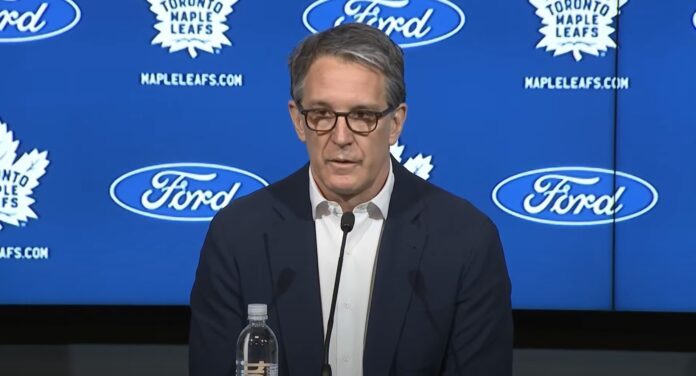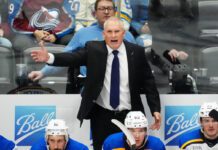
At Friday’s press conference, Maple Leafs President and Alternate Governor Brendan Shanahan discussed the firing of Sheldon Keefe, another disappointing playoff showing from his team, and whether he is going to revisit his commitment to his core players.
Opening Statement on the dismissal of Sheldon Keefe, reflection on the season
Shanahan: First off, I would like to thank Sheldon Keefe for the nine seasons that he has given this organization, five as head coach of the Toronto Maple Leafs.
Sheldon had a difficult job. As he had stated, he addresses the players every single day. He addresses the media two times, sometimes three times a day. I just want to say that in that entire time with us, Sheldon has done it with dignity, with grace, and with professionalism.
I would like to thank his wife, Jackie, and his sons, Landon and Wyatt. Sheldon is a great coach, and they don’t need me to tell them this, but he is an even better man. Thank you to Sheldon.
I also respected the fact that Sheldon took on a lot of the responsibility for the lack of results in the playoffs. I respect that. However, the reality of the situation is that the ultimate responsibility is on me. The accountability is on me.
Our playoff results have not been good enough. That is on me. The results that we have had in the playoffs—our players know, I know, we know—are unacceptable. They are unacceptable to our fans. They are unacceptable to all those who support the Toronto Maple Leafs.
We analyze at the end of every season. We look at our team, and we look forward. We look for ways to be better. We do that every year. In the past, I believe that there are times when you talk about patience. I still believe there are times when patience is the suitable call. However, when you see patterns persist, and the results don’t change, you have to adjust the way you think about things.
We will look at everything this summer. We will consider everything this summer. All with the intention of the one thing we are here for — to make the Maple Leafs better and to win.
Q&A
When you say everything is on the table this summer, is it safe to say it includes asking Mitch Marner and John Tavares if they would be willing to waive their NMCs? If so, what is your sense of how receptive they would be to that?
Shanahan: It is important to state that even since the season ended, everything is on the table. We will discuss everything. I don’t think it serves the Maple Leafs in any fashion to discuss those things prematurely or discuss those individuals prematurely.
Our focus right now is on finding a new head coach. Certainly, that new head coach will have an important voice as part of our decisions moving forward. I am simply saying that whatever questions you guys ask us, generally speaking, they are things we are going to have to consider after what we have seen.
Brad and Keith are relatively new here, but I am not. I have seen some of these things over the years. Again, I do believe there is a time for preaching patience. I do believe there is a time when you have to examine some of the patterns that persist. Everything will be on the table.
I don’t think it serves the Toronto Maple Leafs well to get into any specifics today.
We heard almost every player talk about how they feel like they are close. The organization has one series win in 20 years. What are they close to? Is one series win acceptable? If so, doesn’t the culture have to change a little bit? Does the bar have to be raised?
Shanahan: What I would say is that they know and understand that those results are not acceptable, but you always want your players to believe. They know there will be changes. They know there will be sacrifices that need to be made and that we need to be better.
They are talking on Monday, and a couple of days earlier, they were fighting for their playoff lives. Them having belief in themselves as individuals and as a group is understandable from my point of view. It is our job and their job to regroup and better prepare for next year.
We see teams scoring four or five goals every night, coming back from 4-1 leads or 4-0 leads. In eight elimination games, the Maple Leafs have scored 11 goals. That is with the best goal-scorer of this generation and some of the highest-paid players in the NHL. How should we believe you can change this now when you haven’t been able to change it for the past eight years?
Shanahan: That is the challenge. That is what we wake up every day thinking of ways in which we can change that narrative and those results.
There are regular-season goals, and then there are playoff goals. I am a firm believer that sometimes, playoff goals come from playoff structure and defensive structure by limiting opportunities against and forcing teams to open things up against you.
That is the question we have to ask ourselves. It has happened too often. It is a question of coaching and messaging. It is also a question of personnel. We recognize exactly what you just stated. When the playoffs come, we don’t get the goals that have been coming in the regular season. How do we change that?
You have to get to the dirty areas to score in the playoffs. Your power play has to be successful to give you that momentum. Unfortunately, aside from the Tampa series in which our power play was good and we ended up winning the series, in all the other series, especially when we have gotten to a Game 7 and faced elimination, we haven’t gotten the results.
That is something we have to work on.
You have expressed a lot of faith in the core players. As you look back, why do you think those guys haven’t been able to push over the top?
Shanahan: That is the difficult question. We have looked back and had different experiences where, if you were to just live in a vacuum and view this one playoff, you might have a different view of our team, the optimism, and the closeness of where we were. We can’t think that way anymore after seeing what we’ve seen year after year after year.
I do believe there are times when the right answer is patience, and then there comes a time when you have to say you have new information. The information has evolved. You have to adjust your way of thinking.
I can tell you the desire is there. Every player who has been here this entire time wants to win in Toronto. Some have had opportunities to work elsewhere and have chosen to come back to Toronto. They are dedicated to getting it done here. I don’t question their dedication, but I do question our ability as a group to get it done in those difficult times.
That is why we have to make some changes. We will continue to look at changes with the goal in mind of what makes the Maple Leafs better, not just in the regular season but at playoff time.
Can you clarify your contractual situation? Is next year the final year of your deal? Do you feel the team needs to have more success for you to stay on?
Shanahan: I am not going to get into the details of my contract and what is correct or not correct. I will say this: It is not a focus for me. From the day I was hired in the spring of 2014 to today, I wake up every day with the goal of trying to find a way to add and make the Maple Leafs better.
My last contract — my first contract with the Maple Leafs — was not addressed or renewed until a month before it expired. It was not a distraction to me then. My contract status will not be a distraction to me or the team now.
Beyond that, I am not going to discuss it.
You have doubled, tripled, and quadrupled down with your faith in this core group. When you look back at it, how do you see it? Is there a level of regret that you have shown faith in them and they have consistently disappointed you?
Shanahan: I don’t have regret for showing faith in people. I wouldn’t put it that way. As Keith alluded to, when we all come to Toronto, especially with where the team is at this stage of their development… There have been times in Leafs history when they are at a different phase, but if you are becoming a part of the Leafs organization now, you know why you are coming here and what you are getting into.
Our fans — not just the ones who live here in Toronto, come to our games, go to Maple Leaf Square, and watch our games on TV — and the way they support us on the road is an important and very driving and moving thing to us and our players. You don’t want to let them down. You want to deliver.
If I felt that the players felt differently than that — in spite of the fact that they haven’t delivered — I might have felt differently about them as well. We have to give them all the tools. We have to make changes where we think changes are going to help our team.
As far as believing in people and having faith in people, you want to help them see things through. I have been in this game for a long time. Whether it is myself, the players, or the staff, we know how it works. We have all seen the good and the bad. We accept the consequences that might come to any of us.
While you are here, the underlying and overriding motivation when you put your head on the pillow at night has to be: Have we made the team better? Have we increased our chances of winning a Stanley Cup? That is what we have to do.
The roster that completed the 2023-24 season had one player with a Stanley Cup ring, Joel Edmundson. Last year, the team broke through and won a series after adding a Conn Smythe Trophy winner, Ryan O’Reilly, as well as a Stanley Cup winner in Luke Schenn. How big of a problem is the lack of winning pedigree? Is it something the franchise will address this offseason?
Shanahan: I think it is important. It is not always the easiest thing to attain, but when we talk about players, staff members, scouts, or coaching staff, it is certainly something we see as an advantage and a benefit. A player like Joel was certainly that.
I think Brad brought in some guys last summer—not necessarily with Stanley Cup rings on their fingers—but he brought an element to the team that we were in alignment with and had a lot more grit. Quite frankly, Brad demanded that the players play more like a brotherhood and a band of brothers. I think they did embrace that.
The results haven’t changed, but I can tell you from 100 years ago with my own experience in Detroit when we won our first Stanley Cup, only Joey Kocur had a Stanley Cup. Steve Yzerman had none. Nik Lidstrom had none. I am sorry — Mike Vernon and Joey Kocur were the only players with Stanley Cups.
Would we love to have a whole bunch of guys here who are bringing that? Would that be an attractive quality we are looking to add in the summertime? Absolutely. I still think it is ultimately on the players who are here and the ones who come back to dig in and know that it can be done. They have to get to an uncomfortable place.
As I have said before, they know and understand that. It is up to us to make the changes that we think will put them in the best position to win.
When you spend so much on so few players, it doesn’t seem to leave you a lot of money left over for the chemistry and unity of the team. Does [Keith Pelley’s] philosophy conflict with how things have been handled over the last nine years? Do you see how it affects how you negotiate with anyone who is potentially looking for a new deal in the near future?
Shanahan [follow up to Keith Pelley’s initial response]: In fairness, that is something that Brad talked about when he came here, as well as the importance of the rest of the team, the players, and the roles. I would like for Brad to talk about that. That was something that he recognized when he came as well.
Do you still believe this core group can win, and if so, why?
Shanahan: That gets back to the essence of the opening statement. There is a time—again, not to repeat myself—when you look at the age and development of players and talk about patience. There comes a time when you see certain patterns and trends repeat themselves. Results repeat themselves. That is what we have to do this summer.
Without getting specific, it is not our intention today to single out any one individual or one small group of the team. We are talking about the whole team. We are saying that it has certainly become evident that we have to assess all of those things and whether we have to make some very difficult decisions this summer to make the team better.
Why now and not one or two summers ago?
Shanahan: It was every summer. It is not that you don’t make those assessments at the end of every season. Two years ago, three years ago, five years ago… You make all of those assessments.
You take the information you have at the time and the information that has been brought to you at that time. Over time, when you see patterns not changing, or you change things around some of your core issues, hoping that the results will be different and they aren’t, that is when you start having to reassess from a different lens.
Different information comes to you. More information comes to you. Certain things that you maybe felt in the past start to shift as you get that new information. It is not that these assessments weren’t made in the past. You have to constantly grow with your information and be willing to adapt with your information.
At the end of the day, it is just saying: When we come back here next year, it might not look like it on the first day of camp—it might be at the trade deadline—but when we are walking into next year’s playoffs—knowing that we have to first make the playoffs—we are a team that feels more confident we can get different results.





























![New Leaf Anthony Stolarz on the opportunity in Toronto: “In Florida, I knew my role as a backup… Now, [Joseph Woll] and I are competing for starts… As a goalie, that’s all you can ask for” Anthony Stolarz, Stanley Cup win, now Maple Leaf](https://mapleleafshotstove.com/wp-content/uploads/2024/07/anthony-stolarz-sc-100x70.jpg)
